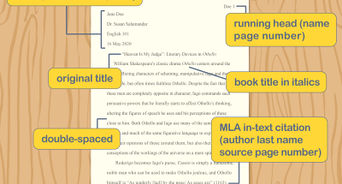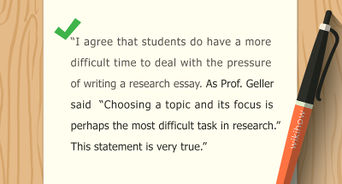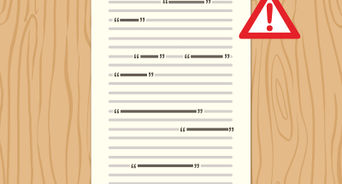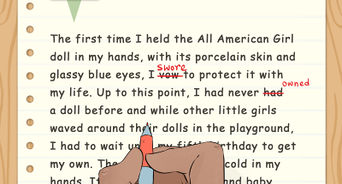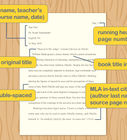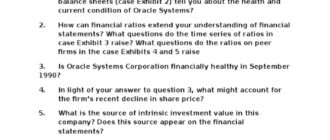How to Write an Essay
Download Article
Download Article
This article was co-authored by Christopher Taylor, PhD. Christopher Taylor is an Adjunct Assistant Professor of English at Austin Community College in Texas. He received his PhD in English Literature and Medieval Studies from the University of Texas at Austin in 2014.
There are 13 references cited in this article, which can be found at the bottom of the page.
wikiHow marks an article as reader-approved once it receives enough positive feedback. This article has 35 testimonials from our readers, earning it our reader-approved status.
This article has been viewed 7,451,764 times.
An essay is a common type of academic writing that you'll likely be asked to do in multiple classes. Before you start writing your essay, make sure you understand the details of the assignment so that you know how to approach the essay and what your focus should be. Once you've chosen a topic, do some research and narrow down the main argument(s) you'd like to make. From there, you'll need to write an outline and flesh out your essay, which should consist of an introduction, body, and conclusion. After your essay is drafted, spend some time revising it to ensure your writing is as strong as possible.
Steps
Part 1 of 4:
Understanding Your Assignment
-
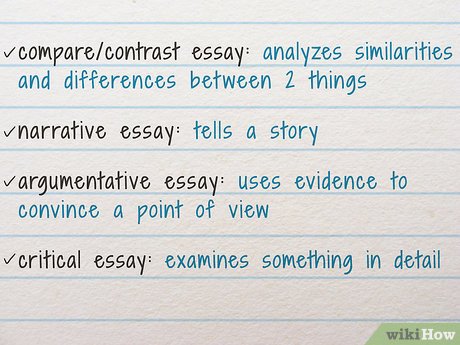
1Read your assignment carefully. The style, structure, and focus of your essay will vary depending on the type of essay you are writing. If you've been assigned to write an essay for a class, review the assignment carefully and look for information about the nature of the essay. A few common types of essays include:[1]
- The compare/contrast essay, which focuses on analyzing the similarities and differences between 2 things, such as ideas, people, events, places, or works of art.
- The narrative essay, which tells a story.
- The argumentative essay, in which the writer uses evidence and examples to convince the reader of their point of view.
- The critical or analytical essay, which examines something (such as a text or work of art) in detail. This type of essay may attempt to answer specific questions about the subject or focus more generally on its meaning.
- The informative essay, that educates the reader about a topic.
-
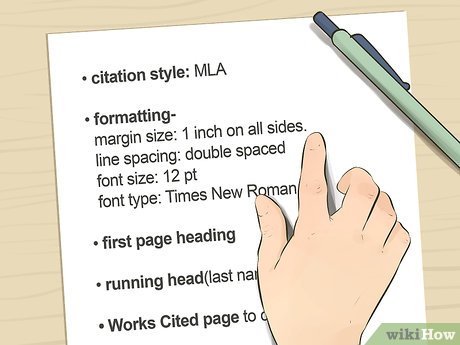 2Check for formatting and style requirements. If you're writing an essay for a class or a publication, there may be specific formatting and style requirements you need to follow. Read your assignment carefully to make sure you understand requirements such as:
2Check for formatting and style requirements. If you're writing an essay for a class or a publication, there may be specific formatting and style requirements you need to follow. Read your assignment carefully to make sure you understand requirements such as:- How long your essay should be
- Which citation style to use
- Formatting requirements, such as margin size, line spacing, and font size and type
EXPERT TIP
Christopher Taylor, PhD
English Professor
Christopher Taylor is an Adjunct Assistant Professor of English at Austin Community College in Texas. He received his PhD in English Literature and Medieval Studies from the University of Texas at Austin in 2014.
 Christopher Taylor, PhD
Christopher Taylor, PhD
English ProfessorChristopher Taylor, Professor of English, tells us: "Most essays will contain an introduction, a body or discussion portion, and a conclusion. When assigned a college essay, make sure to check the specific structural conventions related to your essay genre, your field of study, and your professor's expectations."
-
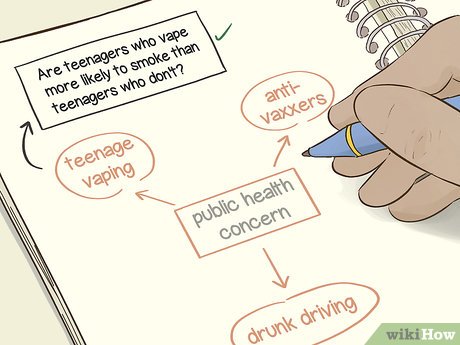 3Narrow down your topic so your essay has a clear focus. Depending on your assignment, you may already have a specific topic you are supposed to write about, or you may simply be asked to write about a general theme or subject. If the assignment doesn't specify your topic, take some time to brainstorm. Try to pick a subject that's specific, interesting to you, and that you think will give you plenty of material to work with.[2]
3Narrow down your topic so your essay has a clear focus. Depending on your assignment, you may already have a specific topic you are supposed to write about, or you may simply be asked to write about a general theme or subject. If the assignment doesn't specify your topic, take some time to brainstorm. Try to pick a subject that's specific, interesting to you, and that you think will give you plenty of material to work with.[2]
- If you're doing a research-based essay, you might find some inspiration from reading through some of the major sources on the subject.
- For a critical essay, you might choose to focus on a particular theme in the work you're discussing, or analyze the meaning of a specific passage.
-
 4Ask for clarification if you don't understand the assignment. If you're not sure what you're supposed to be writing about or how to structure your essay, don't hesitate to ask! Your instructor can help clarify anything you don't understand, and they may even be able to provide examples of the type of work they're looking for.[3]
4Ask for clarification if you don't understand the assignment. If you're not sure what you're supposed to be writing about or how to structure your essay, don't hesitate to ask! Your instructor can help clarify anything you don't understand, and they may even be able to provide examples of the type of work they're looking for.[3]
- If you're having trouble narrowing down your topic, your instructor might be able to provide guidance or inspiration.
Advertisement
Part 2 of 4:
Planning and Organizing Your Essay
-
 1Find some reputable sources on your topic. If you're writing an academic essay or any type of essay that requires you to support your claims with evidence and examples, you'll probably need to do some research. Head to your library or go online to find up-to-date sources that provide accurate, verifiable information about your topic.[4]
1Find some reputable sources on your topic. If you're writing an academic essay or any type of essay that requires you to support your claims with evidence and examples, you'll probably need to do some research. Head to your library or go online to find up-to-date sources that provide accurate, verifiable information about your topic.[4]
- Academic books and journals tend to be good sources of information. In addition to print sources, you may be able to find reliable information in scholarly databases such as JSTOR and Google Scholar.
- You can also look for primary source documents, such as letters, eyewitness accounts, and photographs.
- Always evaluate your sources critically. Even research papers by reputable academics can contain hidden biases, outdated information, and simple errors or faulty logic.
Tip: In general, Wikipedia articles are not considered appropriate sources for academic writing. However, you may be able to find useful sources in the “References” section at the end of the article.
-
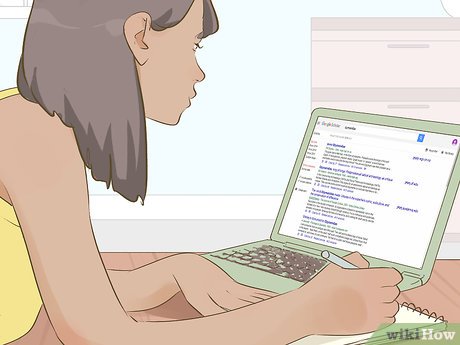 2Make notes as you do your research. As you're researching your topic, keep detailed notes about relevant information, ideas that interest you, and questions that you need to explore further. If you plan to use any of the information that you find in your paper, write down detailed citation information. This will allow you to find the information again and cite it properly.[5]
2Make notes as you do your research. As you're researching your topic, keep detailed notes about relevant information, ideas that interest you, and questions that you need to explore further. If you plan to use any of the information that you find in your paper, write down detailed citation information. This will allow you to find the information again and cite it properly.[5]
- You might find it helpful to write your notes down on individual note cards or enter them into a text document on your computer so you can easily copy, paste, and rearrange them however you like.
- Try organizing your notes into different categories so you can identify specific ideas you'd like to focus on. For example, if you're analyzing a short story, you might put all your notes on a particular theme or character together.
-
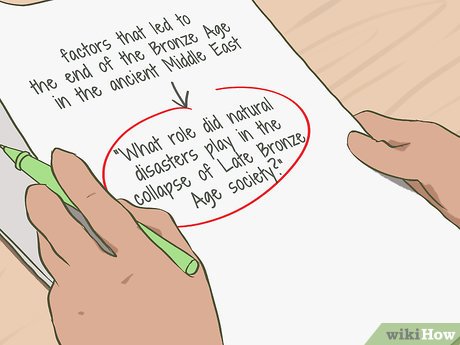 3Choose a question to answer or an issue to address. As you do your research, you will likely find yourself narrowing your focus even further. For example, you might discover that there is a particular question you want to answer, or that there's a popular argument or theory about your topic that you'd like to try to disprove. This question or issue will form the basis for your thesis, or main argument.[6]
3Choose a question to answer or an issue to address. As you do your research, you will likely find yourself narrowing your focus even further. For example, you might discover that there is a particular question you want to answer, or that there's a popular argument or theory about your topic that you'd like to try to disprove. This question or issue will form the basis for your thesis, or main argument.[6]
- For example, if your essay is about the factors that led to the end of the Bronze Age in the ancient Middle East, you might focus on the question, “What role did natural disasters play in the collapse of Late Bronze Age society?”
-
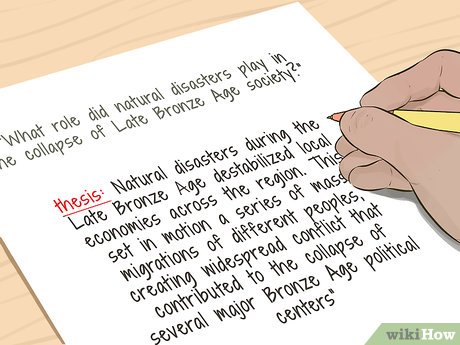 4Create a thesis statement that summarizes your main argument. Once you've hit on a specific question or idea you'd like to address in your essay, look at your research and think about the major point or argument you'd like to make. Try to summarize your main point concisely, in 1-2 sentences. This will be your thesis statement.[7]
4Create a thesis statement that summarizes your main argument. Once you've hit on a specific question or idea you'd like to address in your essay, look at your research and think about the major point or argument you'd like to make. Try to summarize your main point concisely, in 1-2 sentences. This will be your thesis statement.[7]
- One easy way to come up with a thesis statement is to briefly answer the main question you would like to address.
- For example, if the question is “What role did natural disasters play in the collapse of Late Bronze Age society?” then your thesis might be, “Natural disasters during the Late Bronze Age destabilized local economies across the region. This set in motion a series of mass migrations of different peoples, creating widespread conflict that contributed to the collapse of several major Bronze Age political centers.”
-
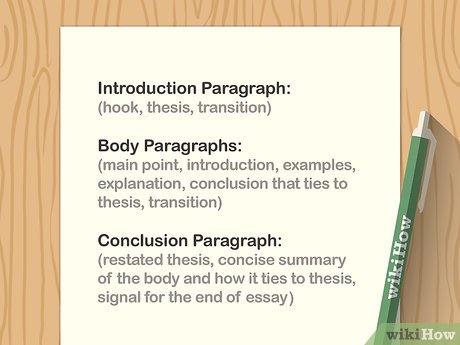 5Write an outline to help organize your main points. After you've created a clear thesis, briefly list the major points you will be making in your essay. You don't need to include a lot of detail—just write 1-2 sentences, or even a few words, outlining what each point or argument will be. Include sub-points addressing the evidence and examples you'll be using to back up each point.[8]
5Write an outline to help organize your main points. After you've created a clear thesis, briefly list the major points you will be making in your essay. You don't need to include a lot of detail—just write 1-2 sentences, or even a few words, outlining what each point or argument will be. Include sub-points addressing the evidence and examples you'll be using to back up each point.[8]
- When you write the outline, think about how you would like to organize your essay. For example, you might start with your strongest arguments and then move to the weakest ones. Or, you could begin with a general overview of the source you're analyzing and then move on to addressing the major themes, tone, and style of the work.
- Your outline might look like this:
- Introduction
- Body
- Point 1, with supporting examples
- Point 2, with supporting examples
- Point 3, with supporting examples
- Major counter-argument(s) to your thesis
- Your rebuttals to the counter-argument(s)
- Conclusion
Advertisement
Part 3 of 4:
Drafting the Essay
-
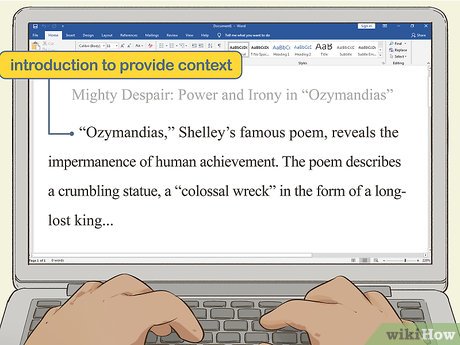 1Write an introduction to provide context. Once you've written your thesis and outline, write an introduction to your essay. This should consist of a brief, general overview of your topic, along with your thesis statement. This is the place to provide information that will help orient the reader and put the rest of your essay in context.[9]
1Write an introduction to provide context. Once you've written your thesis and outline, write an introduction to your essay. This should consist of a brief, general overview of your topic, along with your thesis statement. This is the place to provide information that will help orient the reader and put the rest of your essay in context.[9]
- For example, if you're writing a critical essay about a work of art, your introduction might start with some basic information about the work, such as who created it, when and where it was created, and a brief description of the work itself. From there, introduce the question(s) about the work you'd like to address and present your thesis.
- A strong introduction should also contain a brief transitional sentence that creates a link to the first point or argument you would like to make. For example, if you're discussing the use of color in a work of art, lead in by saying you'd like to start with an overview of symbolic color use in contemporary works by other artists.
Tip: Some writers find it helpful to write the introduction after they've written the rest of the essay. Once you've written out your main points, it's easier to summarize the gist of your essay in a few introductory sentences.
-
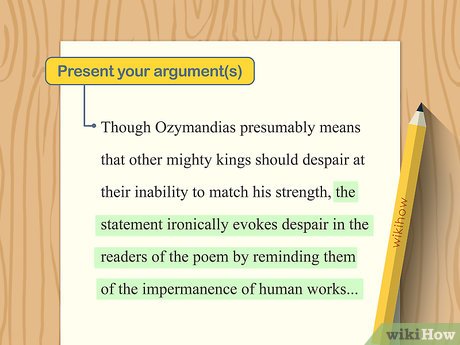 2Present your argument(s) in detail. Working from your outline, write a series of paragraphs addressing each of the major points you'd like to make. Each paragraph should contain a topic sentence, which is like a miniature thesis—it briefly explains the main point you are trying to make with your paragraph. Follow up your topic sentence with a few concrete examples to support your point.[10]
2Present your argument(s) in detail. Working from your outline, write a series of paragraphs addressing each of the major points you'd like to make. Each paragraph should contain a topic sentence, which is like a miniature thesis—it briefly explains the main point you are trying to make with your paragraph. Follow up your topic sentence with a few concrete examples to support your point.[10]
- For example, your topic sentence might be something like, “Arthur Conan Doyle's Sherlock Holmes stories are among the many literary influences apparent in P. G. Wodehouse's Jeeves novels.” You could then back this up by quoting a passage that contains a reference to Sherlock Holmes.
- Try to show how the arguments in each paragraph link back to the main thesis of your essay.
-
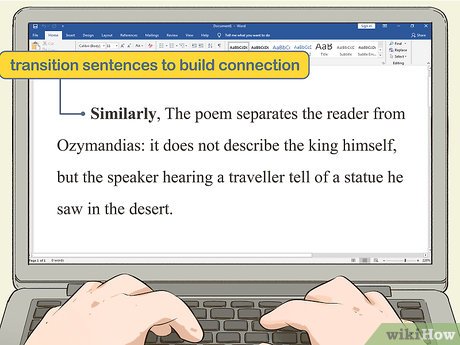 3Use transition sentences between paragraphs. Your essay will flow better if you build connections or smooth transitions between your arguments. Try to find logical ways to link each paragraph or topic to the one before or after.[11]
3Use transition sentences between paragraphs. Your essay will flow better if you build connections or smooth transitions between your arguments. Try to find logical ways to link each paragraph or topic to the one before or after.[11]
- When creating transitions, transitional phrases can be helpful. For example, use words and phrases such as “In addition,” “Therefore,” “Similarly,” “Subsequently,” or “As a result.”
- For example, if you've just discussed the use of color to create contrast in a work of art, you might start the next paragraph with, “In addition to color, the artist also uses different line weights to distinguish between the more static and dynamic figures in the scene.”
-
 4Address possible counterarguments. If you're writing an argumentative essay, get familiar with the major arguments against your point of view. You'll need to incorporate those counterarguments into your essay and present convincing evidence against them.[12]
4Address possible counterarguments. If you're writing an argumentative essay, get familiar with the major arguments against your point of view. You'll need to incorporate those counterarguments into your essay and present convincing evidence against them.[12]
- For example, if you're arguing that a particular kind of shrimp decorates its shell with red algae to attract a mate, you'll need to address the counterargument that the shell decoration is actually a warning to predators. You might do this by presenting evidence that the red shrimp are, in fact, more likely to get eaten than shrimp with undecorated shells.
-
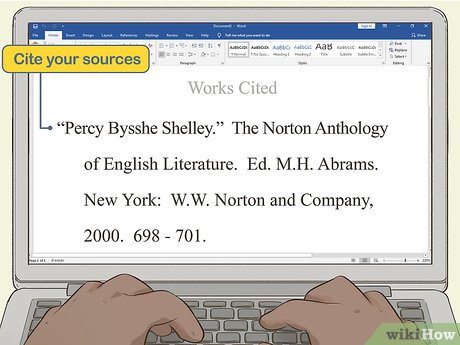 5Cite your sources properly. If you plan to use someone else's ideas or information that you got from another source, you will need to credit the source of your information. This is true whether you're quoting another source directly or simply summarizing or paraphrasing their words or ideas.[13]
5Cite your sources properly. If you plan to use someone else's ideas or information that you got from another source, you will need to credit the source of your information. This is true whether you're quoting another source directly or simply summarizing or paraphrasing their words or ideas.[13]
- The way you cite your sources will vary depending on the citation style you're using. Typically, you'll need to include the name of the author, the title and publication date of the source, and location information such as the page number on which the information appears.
- In general, you don't need to cite common knowledge. For example, if you say, “A zebra is a type of mammal,” you probably won't need to cite a source.
- If you've cited any sources in the essay, you'll need to include a list of works cited (or a bibliography) at the end.
-
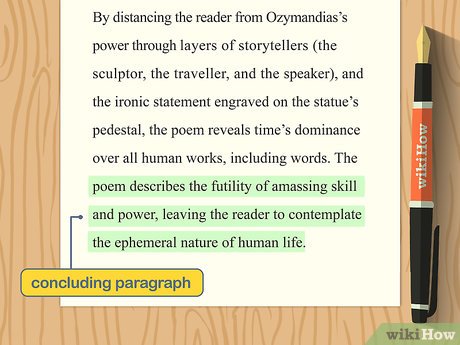 6Wrap up with a concluding paragraph. To finish off your essay, write a paragraph that briefly reiterates the main point of your essay. State how your arguments support your thesis and briefly summarize your major insights or arguments. You might also discuss questions that are still unanswered or ideas that merit further exploration.[14]
6Wrap up with a concluding paragraph. To finish off your essay, write a paragraph that briefly reiterates the main point of your essay. State how your arguments support your thesis and briefly summarize your major insights or arguments. You might also discuss questions that are still unanswered or ideas that merit further exploration.[14]
- Keep your conclusion brief. While the appropriate length will vary based on the length of the essay, it should typically be no longer than 1-2 paragraphs.
- For example, if you're writing a 1,000-word essay, your conclusion should be about 4-5 sentences long.[15]
Advertisement
Part 4 of 4:
Revising the Essay
-
 1Take a break after finishing your first draft. After drafting your essay, it's a good idea to take some time away from it. That way, you can come back to it and look at it again with a fresh perspective.[16]
1Take a break after finishing your first draft. After drafting your essay, it's a good idea to take some time away from it. That way, you can come back to it and look at it again with a fresh perspective.[16]
If possible, take 1-2 days before you look at it again.- If you don't have time to spend a couple of days away from your essay, at least take a few hours to relax or work on something else.
-
 2Read over your draft to check for obvious problems. When you're ready to work on your essay again, first read it over to look for any major problems. You might find it helpful to read the essay out loud since your ears can pick up on things your eyes might miss. If you spot anything, make a note of it, but don't try to fix it right away. Look out for issues such as:[17]
2Read over your draft to check for obvious problems. When you're ready to work on your essay again, first read it over to look for any major problems. You might find it helpful to read the essay out loud since your ears can pick up on things your eyes might miss. If you spot anything, make a note of it, but don't try to fix it right away. Look out for issues such as:[17]
- Excessive wordiness
- Points that aren't explained clearly enough
- Tangents or unnecessary information
- Unclear transitions or illogical organization
- Spelling, grammar, style, and formatting problems
- Inappropriate language or tone (e.g., slang or informal language in an academic essay)
-
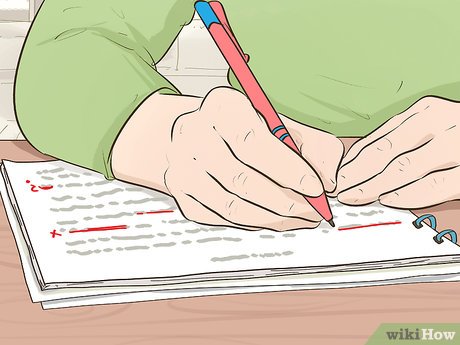 3Correct any major problems you find. Once you've read over your essay, go through and edit it. When you're done, go back over the essay again to make sure it flows well and that there aren't any problems you missed.[18]
3Correct any major problems you find. Once you've read over your essay, go through and edit it. When you're done, go back over the essay again to make sure it flows well and that there aren't any problems you missed.[18]
- You might have to cut material from your essay in some places and add new material to others.
- You might also end up reordering some of the content of the essay if you think that helps it flow better.
-
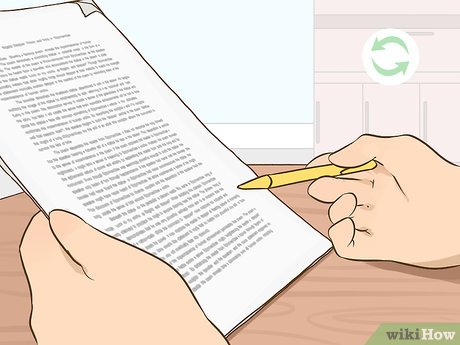 4Proofread your revised essay. After editing your essay, go over it again closely to spot any minor errors, such as typos or formatting problems. There may be issues that you missed during your initial round of editing, and there could also be new typos or formatting issues if you made changes to the original draft. You may find it easier to spot these errors on a printout rather than on an electronic version of your essay.[19]
4Proofread your revised essay. After editing your essay, go over it again closely to spot any minor errors, such as typos or formatting problems. There may be issues that you missed during your initial round of editing, and there could also be new typos or formatting issues if you made changes to the original draft. You may find it easier to spot these errors on a printout rather than on an electronic version of your essay.[19]
- Read over each line slowly and carefully. It may be helpful to read each sentence out loud to yourself.
Tip: If possible, have someone else check your work. When you've been looking at your own writing for too long, your brain begins to fill in what it expects to see rather than what's actually there, making it harder for you to spot mistakes.
Advertisement
Essay Help
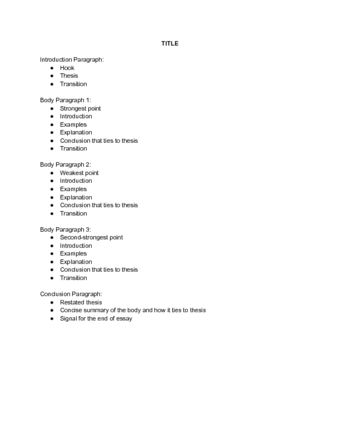
Essay Template
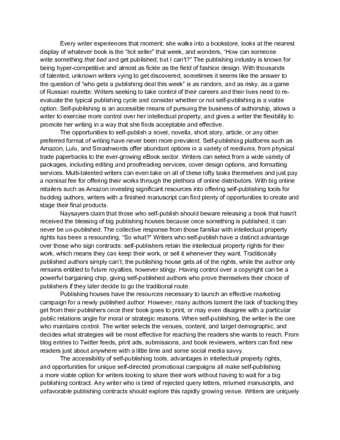
Sample Informative Essay
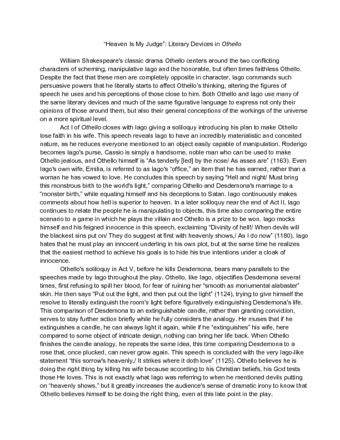
Sample Othello Essay
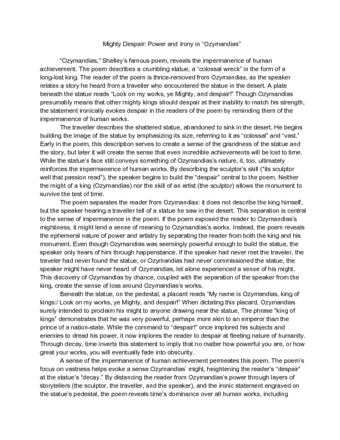
Sample Ozymandias Essay
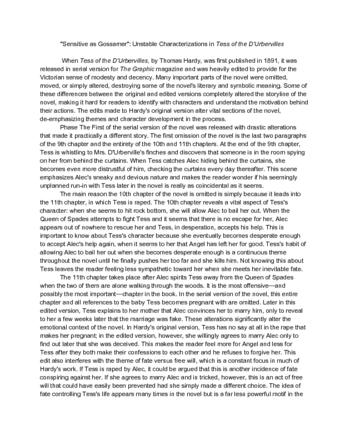
Sample Tess of the d'Urbervilles Essay
Community Q&A
Add New Question
-
QuestionHow do you begin an essay?

Christopher Taylor, PhD
English Professor
Christopher Taylor is an Adjunct Assistant Professor of English at Austin Community College in Texas. He received his PhD in English Literature and Medieval Studies from the University of Texas at Austin in 2014.
 Christopher Taylor, PhDEnglish ProfessorExpert AnswerBegin your essay by narrowing your topic, researching your topic, taking notes, and brainstorming your ideas.
Christopher Taylor, PhDEnglish ProfessorExpert AnswerBegin your essay by narrowing your topic, researching your topic, taking notes, and brainstorming your ideas. -
QuestionWhat is the format of an essay?

Christopher Taylor, PhD
English Professor
Christopher Taylor is an Adjunct Assistant Professor of English at Austin Community College in Texas. He received his PhD in English Literature and Medieval Studies from the University of Texas at Austin in 2014.
 Christopher Taylor, PhDEnglish ProfessorExpert AnswerDifferent essay genres can have different formats. Make sure to check the specific conventions of your essay genre with your professor.
Christopher Taylor, PhDEnglish ProfessorExpert AnswerDifferent essay genres can have different formats. Make sure to check the specific conventions of your essay genre with your professor. -
QuestionWhat is an essay?

Christopher Taylor, PhD
English Professor
Christopher Taylor is an Adjunct Assistant Professor of English at Austin Community College in Texas. He received his PhD in English Literature and Medieval Studies from the University of Texas at Austin in 2014.
 Christopher Taylor, PhDEnglish ProfessorExpert AnswerA college essay is a formal writing assignment that can take many forms. Persuasive, descriptive, analytical, expository, and personal are examples of types of college essays.
Christopher Taylor, PhDEnglish ProfessorExpert AnswerA college essay is a formal writing assignment that can take many forms. Persuasive, descriptive, analytical, expository, and personal are examples of types of college essays. -
QuestionHow do I write an argumentative essay?
 wikiHow Staff Editor
wikiHow Staff Editor
Staff AnswerThis answer was written by one of our trained team of researchers who validated it for accuracy and comprehensiveness.
 wikiHow Staff EditorStaff AnswerStart by defining the main argument you'd like to make in a few sentences. This will be your thesis statement. From there, you'll need to present a few different arguments that support your thesis. Support each of them with specific evidence and examples. Make sure to address any major counterarguments or evidence against your thesis.
wikiHow Staff EditorStaff AnswerStart by defining the main argument you'd like to make in a few sentences. This will be your thesis statement. From there, you'll need to present a few different arguments that support your thesis. Support each of them with specific evidence and examples. Make sure to address any major counterarguments or evidence against your thesis. -
QuestionI can't even get one word WITH a topic. How do I write one sentence?
 wikiHow Staff Editor
wikiHow Staff Editor
Staff AnswerThis answer was written by one of our trained team of researchers who validated it for accuracy and comprehensiveness.
 wikiHow Staff EditorStaff AnswerStart by jotting down any ideas you have. You might find it helpful to do some reading on your topic and make notes about anything you find interesting or any questions you have. Try doing some free-writing and putting down any thought that jumps into your head.
wikiHow Staff EditorStaff AnswerStart by jotting down any ideas you have. You might find it helpful to do some reading on your topic and make notes about anything you find interesting or any questions you have. Try doing some free-writing and putting down any thought that jumps into your head. -
QuestionWhere can I find example essays?
 wikiHow Staff Editor
wikiHow Staff Editor
Staff AnswerThis answer was written by one of our trained team of researchers who validated it for accuracy and comprehensiveness.
 wikiHow Staff EditorStaff AnswerThere are numerous example essays online. Do a search for the type of essay you’re looking for, e.g., “example expository essays.” You can also find examples in many English composition textbooks.
wikiHow Staff EditorStaff AnswerThere are numerous example essays online. Do a search for the type of essay you’re looking for, e.g., “example expository essays.” You can also find examples in many English composition textbooks. -
QuestionWhat are the main different types of essays?
 wikiHow Staff Editor
wikiHow Staff Editor
Staff AnswerThis answer was written by one of our trained team of researchers who validated it for accuracy and comprehensiveness.
 wikiHow Staff EditorStaff AnswerThere are many kinds of essays, but some of the common major categories are narrative, descriptive, expository, compare and contrast, and persuasive. Typically, your assignment instructions will either clearly state what kind of essay you need to write or use words that clue you in (e.g., an assignment for a persuasive essay might include phrases like “Use examples to support your argument”).
wikiHow Staff EditorStaff AnswerThere are many kinds of essays, but some of the common major categories are narrative, descriptive, expository, compare and contrast, and persuasive. Typically, your assignment instructions will either clearly state what kind of essay you need to write or use words that clue you in (e.g., an assignment for a persuasive essay might include phrases like “Use examples to support your argument”). -
QuestionHow do you begin the introduction?
 Community AnswerStart with a great fact, story, or compelling idea, then grow from there. If you're stuck, many writers save their intro until the end, once they know the actual direction and evidence in the rest of the essay.
Community AnswerStart with a great fact, story, or compelling idea, then grow from there. If you're stuck, many writers save their intro until the end, once they know the actual direction and evidence in the rest of the essay. -
QuestionHow long should a paragraph be in my essay body?
 Community Answer5 - 7 sentences is an appropriate length for paragraphs in the body.
Community Answer5 - 7 sentences is an appropriate length for paragraphs in the body. -
QuestionHow do I know how to start an essay?
 Community AnswerTry to start with something intriguing and promising. Questions can be really effective for an introduction. Aim for an introduction that has an explicit relation to the topic/title of your essay, and avoid analyzing the topic in your first paragraph.
Community AnswerTry to start with something intriguing and promising. Questions can be really effective for an introduction. Aim for an introduction that has an explicit relation to the topic/title of your essay, and avoid analyzing the topic in your first paragraph.
Show more answers
Submit
Video
References
- ↑ https://www.gallaudet.edu/tutorial-and-instructional-programs/english-center/the-process-and-type-of-writing/styles-of-essays/guide-to-different-kinds-of-essays
- ↑ https://writingcenter.fas.harvard.edu/pages/moving-assignment-topic
- ↑ https://writingcenter.fas.harvard.edu/pages/how-read-assignment
- ↑ http://www.easybib.com/guides/students/writing-guide/ii-research/a-finding-sources/
- ↑ https://writingcenter.fas.harvard.edu/pages/moving-assignment-topic
- ↑ https://writingcenter.fas.harvard.edu/pages/developing-thesis
- ↑ https://writingcenter.fas.harvard.edu/pages/developing-thesis
- ↑ https://writingcenter.fas.harvard.edu/pages/outlining
- ↑ https://www2.le.ac.uk/offices/ld/resources/writing/writing-resources/writing-essays
- ↑ https://intranet.ecu.edu.au/__data/assets/pdf_file/0017/20609/essay.pdf
- ↑ https://writingcenter.unc.edu/tips-and-tools/transitions/
- ↑ http://www.nus.edu.sg/celc/research/books/cwtuc/chapter01.pdf
- ↑ https://www.plagiarism.org/article/how-do-i-cite-sources
- ↑ https://intranet.ecu.edu.au/__data/assets/pdf_file/0017/20609/essay.pdf
- ↑ https://www.utsc.utoronto.ca/twc/sites/utsc.utoronto.ca.twc/files/resource-files/Intros-Conclusions.pdf
- ↑ https://www2.le.ac.uk/offices/ld/resources/writing/writing-resources/writing-essays
- ↑ https://www2.le.ac.uk/offices/ld/resources/writing/questions-to-ask/questions-to-ask-when-editing
- ↑ http://www.nus.edu.sg/celc/research/books/cwtuc/chapter01.pdf
- ↑ http://www.nus.edu.sg/celc/research/books/cwtuc/chapter01.pdf
About This Article
If you need to write an essay, start by gathering information from reputable sources, like books from the library or scholarly journals online. Take detailed notes and keep track of which facts come from which sources. As you're taking notes, look for a central theme that you're interested in writing about to create your thesis statement. Then, organize your notes into an outline that supports and explains your thesis statement. Working from your outline, write an introduction and subsequent paragraphs to address each major point. Start every paragraph with a topic sentence that briefly explains the main point of that paragraph. Finally, finish your paper with a strong conclusion that sums up the most important points. For tips from our English Professor co-author on helpful revision techniques, keep reading!
- Send fan mail to authors
Reader Success Stories
-
 "Amazing and helpful article.These days, essay writing is required by high school and college grads, no matter the field of study. If you follow the format presented above, it will help you write a compelling and engaging essay."..." more
"Amazing and helpful article.These days, essay writing is required by high school and college grads, no matter the field of study. If you follow the format presented above, it will help you write a compelling and engaging essay."..." more
More reader stories
Hide reader stories
Share your story
Did this article help you?

July 11, 2021 Tips to write an essay - Augusta Free Press
July 11, 2021 - Augusta Free PressJuly 11, 2021 Tips to write an essay Augusta Free Press...
Write My Essay For Me: Best Essay Writing Services - Cleveland Scene
July 9, 2021 - Cleveland SceneWrite My Essay For Me: Best Essay Writing Services Cleveland Scene...
How to write an English essay correctly - PVP Live
July 26, 2021 - PVP LiveHow to write an English essay correctly PVP Live...
I Signed Up to Write College Essays for Rich Kids. I Found Cheating Is More Complicated Than I Thought. - Slate
July 6, 2021 - SlateI Signed Up to Write College Essays for Rich Kids. I Found Cheating Is More Complicated Than I Thought. Slate...
How to find a company that can help you write an essay - Sonoma Valley Sun
July 20, 2021 - Sonoma Valley SunHow to find a company that can help you write an essay Sonoma Valley Sun...
Writing an Outline Can Help a Student Write an Essay | Skymet Weather Services - Skymet Weather
July 29, 2021 - Skymet WeatherWriting an Outline Can Help a Student Write an Essay | Skymet Weather Services Skymet Weather...

